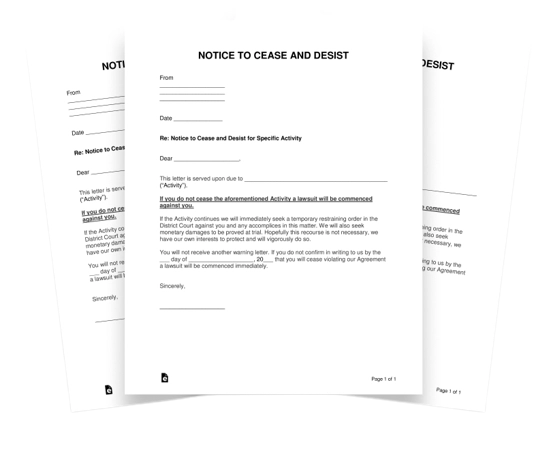Non Disclosure Agreement

Download a Free Non Disclosure Agreements template
Created and approved by the experts at CMI Group for your use.
Non disclosure agreements, or NDAs, are an essential tool for businesses in Sydney to protect their confidential information. Whether you’re a startup company or an established business, NDAs are a necessary precaution to ensure your sensitive information is kept safe from competitors, partners, or other third parties. NDAs are legally binding contracts that prohibit the receiving party from disclosing confidential information shared by the disclosing party. In this blog, we will discuss the importance of Non disclosure agreement template Australia, explain what NDAs are, and provide legal services and best practices for businesses looking to use them.
At CMI Legal, we understand the importance of protecting your confidential agreement. As a leading law firm based in Sydney, we specialize in providing non disclosure agreement template australia to businesses of all sizes. Whether you’re looking to draft a new NDA or in need of legal services, our team of experienced attorneys can help you navigate the legal complexities and ensure your NDA is strong and enforceable. We also provide legal advice and guidance on how to best protect your confidential information.
Get a Non Disclosure Agreements template created by CMI’s expert Lawyers.
What Is A Non Disclosure Agreement Template Australia?
A non-disclosure agreement (NDA) is a legally binding contract that prohibits one or more parties (the disclosing party) from disclosing confidential information to the other party (the receiving party). The purpose of an NDA is to protect the confidential information of a business or individual from being disclosed to unauthorized third parties. NDAs are commonly used in situations where a business or individual needs to share sensitive information with another party, such as a potential partner or investor, but wants to ensure that the information is kept confidential. In the NDA, the parties agree that the information is not to be shared with any third party without the express written consent of the divulge party.
In a unilateral NDA, only one party is disclosing confidential information to the other party, in a bilateral NDA, both parties are disclosing confidential information to each other and in a multilateral NDA, more than two parties are disclosing confidential information to each other. It is important that the parties are clearly defined in the agreement and the obligations of each party are clearly spelled out, especially the obligations of the receiving party or the other party.
Non disclosure agreement is governed by contract law in Sydney, which means that they are legally binding and enforceable in court. The laws and regulations governing NDAs in Sydney are similar to those in other states and territories of Australia. However, there are some specific considerations for businesses in Sydney to keep in mind.
Enforcement
Recent Changes
There have not been any recent changes or updates to NDA laws in Sydney, but it’s important to be aware of any changes in the future. Additionally, it’s important to keep in mind that Non disclosure agreement is subject to review by the court and can be deemed unenforceable if they are overly restrictive or unfairly one-sided.
Other Considerations
Businesses in Sydney should also be aware of other laws that may impact the use of NDAs. For example, competition laws may restrict the use of NDAs in certain circumstances, and privacy laws may place limits on the collection, use, and disclosure of personal information. Additionally, certain industries, such as healthcare, finance, and government, may have specific laws and regulations that govern the use of NDAs. It is important to understand these laws and regulations, as well as the specific considerations for your industry, in order to ensure that your NDAs are legally compliant and effective in protecting your confidential information.
NDAs Generally Have Three Key Components:
Examples Of Situations Where An Non Disclosure Agreement Would Be Used
In this scenario, the startup company may use a non-disclosure agreement (NDA) to protect its party’s confidential information, such as financial projections, market analysis, and product plans, from being shared with unauthorized parties. This is to prevent potential investors from sharing the information with competitors or using it for their own gain, before the startup is ready to go public.
A company sharing its product development plans with a potential partner. In this scenario, the company may use an Non disclosure agreement to protect its confidential information, such as product design, technology, and manufacturing process, from being shared with unauthorized parties. This is to prevent the potential partner from sharing the information with competitors or using it for their own gain, before the company is ready to launch the product. Additionally, an Non disclosure agreement can also protect the company from any property infringement from the partner’s end.
In this scenario, the company may use an Non-disclosure agreement (NDA) to protect confidential information, such as revenue, profit margin, and debt information, from being shared with unauthorized parties. This is to prevent the potential acquirer from sharing the information with competitors or using it for their own gain, before the company is ready to finalize the acquisition. Additionally, an NDA can also protect the company from any financial exploitation from the acquirer’s end. It is important to note that NDAs are not the only legal documents that companies can use to protect their confidential information. Other legal documents such as non-compete agreements, non-solicitation agreements, and non-circumvention agreements can also be used in conjunction with NDAs to provide additional protection for a company’s information. It’s advisable to seek legal advice to ensure that your company’s legal documents are tailored to your specific needs and are legally binding and enforceable.
In this scenario, a confidentiality contract also known as Non disclosure agreement (NDA) can be used to protect the individual’s personal and sensitive information, such as mental health, medical history and personal relationships from being shared with unauthorized parties. This is to ensure the individual’s confidentiality and privacy is protected, which is vital for building trust in the therapeutic relationship. Additionally, a NDA can also protect the therapist or healthcare professional from any legal repercussions if the individual’s information is shared with any unauthorized parties.
In this scenario, an Non disclosure agreement can be used to protect the inventor’s confidential patent ideas, such as technology, design, and function, from being shared with unauthorized parties. This is to prevent the manufacturing company from using the ideas for their own gain before the patent is filed, and also to protect the inventor’s rights to the idea. Additionally, an Non disclosure agreement can also ensure that the manufacturing company does not disclose the idea to any third parties or use it in any unauthorized manner, which could compromise the inventor’s patent rights.
In this scenario, a confidentiality agreement template also known as non-disclosure agreement (NDA) can be used to protect confidential information, such as business strategies, financial information, and trade secrets, from being shared with unauthorized parties. This is to ensure the disclosing party competitive advantage is protected and to prevent the potential business partner or collaborator from using the information for their own gain before a formal partnership or collaboration is established. Additionally, a NDA can also protect the disclosing party from any intellectual property infringement or breach of trust from the partner or collaborator’s end.
In this scenario, a confidentiality agreement template or non disclosure agreement (NDA) can be used to protect the company’s confidential proprietary information, such as patent-pending ideas, trade secrets, trademarks, and copyrighted material from being shared with unauthorized parties. This is to ensure the company’s rights to the proprietary information is protected and to prevent the potential partner from using the information for their own gain before a formal partnership is established. Additionally, a Non disclosure agreement can also protect the company from any property infringement or breach of trust from the partner’s end. The Non disclosure agreement would prohibit the partner from using or disclosing the intellectual property without the company’s consent and also ensure that the partner does not use the intellectual property in any unauthorized manner which would compromise the company’s rights.
NDA Best Practices For Sydney Businesses
Non disclosure agreement is an essential tool for protecting confidential information, but they are only effective if they are properly drafted and used. Here are some tips and best practices for businesses in Sydney to keep in mind:
Clearly define the confidential information that is being protected by the non disclosure agreements. This will make t easier to enforce the NDA in the event of a breach. Additionally, make sure to include a clear definition of the “receiving party” and the “disclosing party” in the legal document, as well as any specific exclusions or exceptions to the confidential information that is being protected.
Make sure that the exclusions and the duration of the non disclosure agreements are realistic and reasonable. An overly restrictive non disclosure agreement or an confidentiality agreement with a very long duration may be difficult to enforce.
Use consistent language and formatting throughout the non disclosure agreement to ensure that it is clear and easy to understand.
Make sure that the non disclosure agreement covers all relevant parties and that it includes provisions for how the confidential information can be used and shared. Additionally, it’s important to keep in mind that an NDA is a legal document and should be treated as such. It’s crucial to have it reviewed by a lawyer before signing it, to ensure that it complies with the laws and regulations in Sydney and that it effectively protects the confidential information of the parties involved.
Be careful when disclosing confidential information, even if the recipient is party to an non disclosure agreement. Make sure that the recipient understands their obligations under the NDA and that they are aware of any restrictions on how the confidential information can be used. Clearly define what information is considered confidential and what information is excluded from the NDA. This will help avoid any confusion or disputes later on.
If you’re unsure about how to draft an Non disclosure agreement or if you have any questions about the legal implications of a confidentiality agreement, seek legal advice from an experienced attorney. CMI Legal law firm in Sydney, understand the importance of protecting your confidential information. Our team of experienced Intellectual Property Lawyers can help you navigate the legal complexities of non disclosure agreement templates and ensure that your NDA is strong and enforceable. We can assist you in drafting new NDAs or reviewing existing ones, and give you advice on how to best protect your confidential information.
It’s important to regularly check that the terms of the NDA are being followed, and to take action if any breaches are discovered. This can be done by conducting periodic audits, sending out reminders of the terms of the NDA, and by including provisions in the NDA that allow for the monitoring of compliance. Additionally, it is important to have a plan in place for addressing any breaches that may occur, such as by providing notice to the violating party and taking legal action if necessary.
Customer Testimonial
Our Happy Clients
Trustindex verifies that the original source of the review is Google. Tina was a great help in guiding us through our first home buying experience. She gave us a lot of great explanations and advice from initial discussion of the process through every step until successful settlement. Communication and resolution of issues was prompt and professional.Trustindex verifies that the original source of the review is Google. Tina is a fantastic lawyer. her responses to my queries were thorough and timely, and impeccable organizational skills! Truly appreciated her clear and consistent communcation througout the entire property-purchasing process. she handled everything with profressionalism and expertise, making what could have been a stressful experience much smoother. Highly recommend!Trustindex verifies that the original source of the review is Google. We had the pleasure of working with Tina as our solicitor for our first home purchase, and we couldn’t have been in better hands. She carefully explained every step of the process, guiding us through what initially felt overwhelming and unfamiliar. Buying off the plan made us particularly cautious, especially when it came to reviewing legal documents. Tina’s meticulous approach put us at ease—she ensured we both clearly understood each aspect, taking the time to highlight and reorganise information to make it more accessible. Her dedication and professionalism made the entire experience far less daunting, and we’re truly grateful for her support.Trustindex verifies that the original source of the review is Google. John and Tina have provided great professional legal service since 2017 for me.Trustindex verifies that the original source of the review is Google. I realised that I hadn’t left a review for my dealings with CMI legal. I had dealt with them a few months ago, but an epiphany made me come and leave a review. 5 stars is insufficient to express their work. We were working Dee and she is an amazing and thorough professional. She goes above and beyond and explains matters that makes you understand things really well. Thank you Dee for your amazing work.Trustindex verifies that the original source of the review is Google. CMI legal where helpful in answering my questions and giving me clarity in regards to my matter. They are really friendly and helpful! ⭐⭐⭐⭐⭐Trustindex verifies that the original source of the review is Google. Tina demonstrated not only her legal professional knowledge in my business, she shared my urgency, understanding my need from inside out, and more importantly provided proactive and thorough advices throughout the processes and procedures. I highly recommend Tina and her team at CMI Legal for professional legal services.Trustindex verifies that the original source of the review is Google. 10/10 for Professionalism, Due diligence and very easy to deal with. Definitely recommended 😊 Tina does whatever she could to ensure your best interest is represented 👍🏻 The CMI Legal team is a team you can trust. There is nowhere else I’d rather be going to for legal advice, you soon will learn why, too.Trustindex verifies that the original source of the review is Google. Tina Tang is doing excellent service job as a profesional lawer and provide valued information about property purchase issue.Thank you so much,we are appreciated to your skilled help and hope to cooperate with your esteemed company,current residential living apartment 506/2-4 Culworth Ave Killara should be put in market,we hope Tina Tang will provide support as well.thank you so much. Joe Shi






